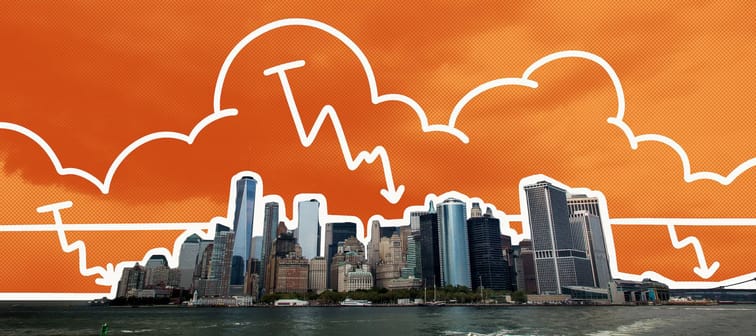Tracing the origins of this term
The term “stagflation” was originally popularized by British politician Iain Macleod in 1965, when he declared that Britain was facing “the best of both worlds” in reference to inflation and stagnation.
Macleod’s portmanteau came in handy over the next decade or so, with the 1970s bringing soaring inflation, along with a recession in the wake of a series of oil price shocks. Until then, many economists had believed that when inflation was high it was usually a result of increased demand — a good indicator typically that the economy is strong and unemployment is low.
Economists generally assumed that meant you couldn’t have high inflation and a stagnant economy. But that theory needed to be reworked when high oil prices and rising inflation collided with high unemployment and a recession over the 1970s.
Moshe Lander, an economist with Concordia University, says stagflation is incredibly uncommon. The world hasn’t seen the convergence of the economic conditions associated with this state since the 1970s.
“This is a once-in-a-generation problem,” says Lander.
Empower Your Investments with Q Trade
Discover Q Trade's award-winning platform and take control of your financial future. With user-friendly tools, expert insights, and low fees, investing has never been easier.
Start Trading TodayWe’re starting to see some worrying signs
Most economists agree we’re not currently in a stagflation environment. What they’re concerned about is whether that’s where the global economy is headed.
Scotiabank’s director of economic forecasting, Nikita Perevalov, indicated in a May report that there are doubts about “the durability of … Canadian economic growth” considering disappointing numbers for manufacturing and wholesale sales from March, as reported by Statistics Canada.
And as spring rolled on, more observers raised red flags. In early June, the World Bank dramatically downgraded its projections for the global economy, citing concerns about Russia’s war in Ukraine, the prospect of widespread food shortages and — you guessed it — “stagflation.”
In its report, the agency also issued its projections for 2023 and 2024 — predicting that a series of oil shocks will increase the possibility of stagflation “reminiscent of the 1970s.”
How do we fix it?
As the World Bank pointed out in its report, the last period of stagflation required interest rates so high that the world tumbled into a recession that left a number of countries in financial crisis.
The Bank of Canada is doing what it can to tackle inflation by raising interest rates. There’s even some speculation that it may increase its overnight target rate by 0.75% come its next meeting on July 13 — but as Lander puts it, there’s a risk that may “take some of the starch out of the Canadian economy in the process.”
BoC governor Tiff Macklem is surely feeling the pressure of trying to balance aggressively tackling inflation — which hit 7.7% in May, according to Statistics Canada’s Consumer Price Index — and “sinking the economy,” says Lander.
David Chaundy, the president and CEO of Atlantic Provinces Economic Council in Halifax, says the biggest risk economists see right now is if inflation goes even higher for longer than policymakers expect.
But given Canada’s strong economy thus far, he’s not too concerned about stagflation for the time being. What he’ll be watching for is whether the economy slows down faster than anticipated, which could happen if the central bank raises interest rates too quickly.
“There’s where we get into a stagflation type of situation,” says Chaundy. “But into next year, I think a slowdown is certainly in the cards. And that’s partly what the bank is trying to engineer.”
“What’s clear is interest rates are going to continue to go up at a fairly steady pace until we start to see some noticeable kind of change.”
Unexpected vet bills don’t have to break the bank
Life with pets is unpredictable, but there are ways to prepare for the unexpected.
Fetch Insurance offers coverage for treatment of accidents, illnesses, prescriptions drugs, emergency care and more.
Plus, their optional wellness plan covers things like routine vet trips, grooming and training costs, if you want to give your pet the all-star treatment while you protect your bank account.
Get A QuoteRed flags to watch out for
What makes Canada’s situation different from other periods of high inflation, Chaundy says, is that most of what’s causing it is external pressures the Bank of Canada can’t control — like Russia’s war in Ukraine and supply chain shortages.
Chaundy says he’ll start to worry if inflation persists longer than expected. In such a competitive job market, employers could be forced to raise wages in line with inflation to attract and keep top talent. That may then lead to a recession or general slowdown.
But of all the things Canadians have to stress over these days, Chaundy would say stagflation doesn’t need to be a top concern right now.
“I think it's the price pressures, what people see [now] and will continue to see throughout this year,” says Chaundy. “I don't think the risk of widespread job losses are really on the cards for this year.”
He’s anticipating the economy may stall next year, but it’s not a given at this point.
“The next six months will give us a better sense of what 2023 looks like,” says Chaundy.
Sponsored
Trade Smarter, Today
With CIBC Investor's Edge, kick-start your portfolio with 100 free trades and up to $4,500 cash back.









